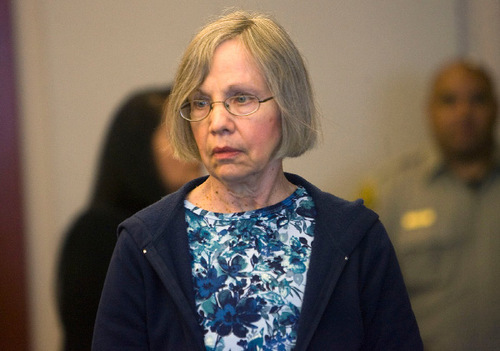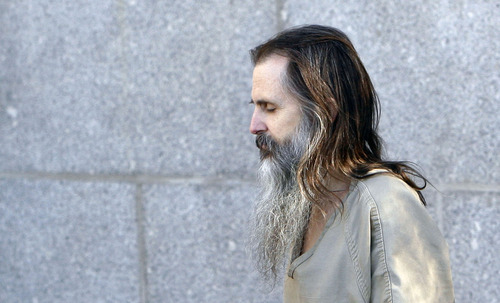This is an archived article that was published on sltrib.com in 2011, and information in the article may be outdated. It is provided only for personal research purposes and may not be reprinted.
Elizabeth Smart has repeatedly claimed her abusers didn't destroy her plans for a happy future — a stance that may now be used by defense attorneys seeking to lessen the pending prison sentence for Brian David Mitchell.
In court documents filed this month, defense attorneys argue that Mitchell did not cause "extreme psychological injury" to Smart when he kidnapped the then-14-year-old girl from her bedroom at knifepoint on June 5, 2002, to make her a plural wife.
As proof, the defense points to Smart's public comments of how she survived her horrific 9-month ordeal at the hands of Mitchell and his wife, Wanda Eileen Barzee, who threatened to kill her and her family if she didn't comply with their wishes.
"Counsel does not agree that Extreme Psychological Injury [to the victim] is applicable in this case, since its application is directly contradicted by the testimony of Ms. Smart and argument by the government, who vigorously argued that Ms. Smart is a 'survivor' who has not been psychologically injured more than other victims of the offenses at issue," wrote defense attorneys Robert Steele and Parker Douglas.
The defense comments are intended as objections to a pre-sentence report filed by a federal probation officer. The report will be considered by U.S. District Judge Dale Kimball at a May 25 sentencing hearing for the 57-year-old Mitchell, who faces up to life in prison.
The defense attorneys' argument angered Smart's father, Ed Smart, who said Monday that he believes "Mitchell deserves every [sentencing] enhancement that is available."
"That is an outrage that they are saying Elizabeth was not psychologically affected by [the crime]," Ed Smart said. "She has moved beyond it, but it certainly impacted her at the time. Does [Elizabeth moving on] mean that Mitchell shouldn't be held responsible for his actions? That's ridiculous."
Defense attorneys have also asked the judge not to consider the pre-sentence report's portrayal of Mitchell as the "organizer, leader, manager or supervisor of the criminal activity" surrounding Elizabeth Smart's abduction. The attorneys suggest Barzee played an equal role in the ongoing abuse of Smart.
The report at issue is available only to judges and attorneys. Typically, it would contain details about the crime; the crime's impact on Smart; Mitchell's criminal and family history; his physical, mental and emotional health; his history of substance abuse; his education and work history; and his ability to pay any potential fines and restitution.
Prosecutors said they plan to file their objections to the report, and to the defense attorneys' statements, on Wednesday.
At sentencing, the judge will consider the filings, as well as federal sentencing guidelines and the attorneys' oral arguments.
Smart, now 23, who recently completed a mission in France for The Church of Jesus Christ of Latter-day Saints, will also have a chance to speak at the sentencing hearing.
Smart testified at a five-week trial in December that Mitchell marched her at knifepoint to a mountain campsite above her Salt Lake City home, where he consummated their "marriage," and then continued to rape her almost daily. The girl, who for a time was tethered to a tree, was forced to watch Mitchell and Barzee engage in sexual activity as a way to "educate" her. The couple also forced her to smoke marijuana and cigarettes and drink alcohol. Later, the trio traveled to California. When they returned to Utah in March 2003, the homeless street preacher and his wife were arrested, and Smart was rescued.
Smart testified that as a survival strategy, she gave up any thought of escape.
"No matter what it took, I would live," Smart testified at trial. "I would survive and do everything he told me to do to keep my life and my family's life intact."
But Smart acknowledged that she initially felt that the rape made her feel dirty and that she wanted to die — ammunition that prosecutors may use to show Mitchell's actions did cause psychological trauma.
"I felt like because [of] what he had done to me that I was marked, that I wasn't clean, wasn't pure, wasn't worth the same," she testified. "I felt like another person would never love me. Yeah, I felt like I could take the risk of being killed and try to escape."
She said those feelings passed when she realized her parents and five siblings would love her no matter what had happened to her.
Defense attorneys also may point to Smart's comments following Mitchell's Dec. 10 jury conviction, as well as her work to curb child abuse and improve laws targeting sex offenders, to try to show a lack of psychological injury.
Following the verdict, Smart said that her attacker's conviction was a chance for other victims to tell their stories.
"I am so thrilled to stand before the people of American today and give hope to other victims who have not spoken out about what's happened to them," she told media gathered outside the courthouse after a 12-person jury convicted Mitchell of felony kidnapping and unlawful transportation of a minor across state lines of the purpose of engaging in sexual activity.
She said her experience shows "it is possible to move on after something terrible has happened, and that we can speak out and we will be heard."
Smart further became a beacon for victims' rights in March, when she was received an award from The Diller-von Furstenberg Family Foundation, which recognizes and supports women who are using their resources, commitment and visibility to transform the lives of other women.
Smart received a $50,000 check, which she plans to use to start The Elizabeth Smart Foundation, aimed at protecting children from abuse, her father, Ed Smart, has told The Salt Lake Tribune.
In 2006, Smart and her parents lobbied Congress to pass a law creating a national sex offender registry. And she was on hand when President George W. Bush signed into law the Adam Walsh Child Protection and Safety Act.
In 2008, Smart shared her story in a booklet titled "You're Not Alone," which is published by the U.S. Department of Justice and given to survivors of abduction.
Smart wrote in one passage, "I made a conscious decision that my abductors had already taken away 9 months of my life, and I certainly was not going to give them any more time than that."
"We all have so much to live for. It is not worth living in the past. Each of us has so much potential in this world. I find it hard to believe that one experience can hold us back from being the individuals we want to be and stop us from doing the things we want to do," Smart wrote.
mrogers@sltrib.com Mitchell's sentence follows co-defendant's in Smart kidnapping case
Brian David Mitchell's wife and co-defendant, Wanda Eileen Barzee, 65, is currently serving a 15-year term at a federal prison in Texas for her part in Elizabeth Smart's June 2002 abduction. A federal court judge gave Barzee credit for the seven years she had already spent either at Utah State Hospital or the Salt Lake County jail.
Barzee's federal time is running concurrently with a one- to 15-year state conviction for the attempted kidnapping of Elizabeth's cousin in July 2002. Barzee will be eligible for state parole in 2018, but she could remain in prison until 2024.







